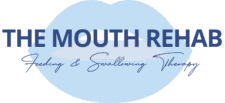The Journey to Better Oral Function Starts Here
At The Mouth Rehab, we specialize in rehabilitating function — one mouth at a time. Whether you’re here for breastfeeding, bottle feeding, chewing, swallowing, speech clarity, or oral habits, our personalized services are designed to meet you where you are and help you thrive. Assessment and therapy are available both in our clinic and through secure teletherapy sessions, so you can choose the option that best fits your lifestyle. Explore our offerings below to see how we can support you or your child’s unique journey to better oral health and communication.
Discover What We Offer
Infant Feeding
Feeding and Swallowing Therapy
Tongue and Lip Ties: Pre/Post Support
Orofacial Myofunctional Therapy
Speech Therapy
1:1 Virtual Support
Don’t know where to start?

Infant Feeding
Feeding shouldn’t be stressful — we’re here to help you and your baby find ease and confidence at every stage. Our infant feeding services are designed to support families through common (and not-so-common) challenges from birth through the transition to solids.
Whether you’re breastfeeding, bottle feeding, or doing a combination of both, we offer guidance with:
Feeding & Swallowing Therapy
Feeding and swallowing therapy supports children who experience challenges with “picky eating”, drinking, or swallowing. These difficulties may stem from oral motor delays, sensory sensitivities, medical conditions, or a combination of factors. Therapy is personalized to each child’s unique needs and is grounded in a compassionate, child-led approach that encourages progress through connection and trust.
Feeding therapy is appropriate for infants, toddlers, and children of all ages—with a focus on building safe, functional, and enjoyable mealtime experiences.
Whether you’re breastfeeding, bottle feeding, or doing a combination of both, we offer guidance with:
Oral Motor and Sensory-Based Feeding Challenges
Oral Motor Delays

Through play-based, purposeful activities, we help children develop stronger and more coordinated oral movements needed for safe feeding and clear speech development down the road.
Sensory Processing Difficulties
Some children have heightened (or lowered) sensitivity to the taste, smell, texture, or temperature of food. This can lead to:
We gently support desensitization through positive exposure, sensory play, and parent coaching—always following the child’s lead.
Myo-Informed Therapy for Children Under Age 4
While traditional orofacial myofunctional therapy typically starts around age 5, younger children can still benefit from a myo-informed approach when early signs of an orofacial myofunctional disorder (OMD) which can only be treated by a feeding therapist (SLP or OT).
OMDs in toddlers may look like:
This proactive support can help lay the foundation for healthy oral development, feeding, sleep, and speech patterns later in life.

Tongue and Lip Ties: Pre/Post Support
A tongue tie, or ankyloglossia, occurs when the tissue connecting the tongue to the floor of the mouth (the lingual frenulum) is too tight, thick, or short. This can restrict tongue movement and lead to a variety of challenges at different stages of life.
As a feeding therapist, I provide specialized support to help infants, children, and even adults overcome the functional difficulties associated with tongue ties. My role is to assess oral motor skills, optimize feeding patterns, and support recovery both before and after a tongue tie release (frenectomy or frenotomy).
Symptoms of a Tongue Tie Across the Lifespan
Infants
Older Children, Teens & Adults
Therapeutic Support Before & After a Tongue Tie Release
Every tongue and every body is unique. Through personalized care, I support families in making informed decisions and empowering healthy feeding, speech, and oral development.
Orofacial Myofunctional Therapy
Myofunctional therapy is a personalized, exercise-based program that helps improve the strength, coordination, and function of the muscles of the face, tongue, mouth, and throat. It focuses on promoting proper oral rest posture, nasal breathing, correct swallowing patterns, and healthy oral habits.
This therapy is appropriate for children ages 5 and older—and in some cases, mature 4-year-olds may also be good candidates. By gently retraining these muscles, myofunctional therapy can support long-term improvements in breathing, eating, speaking, sleep, and overall wellness.
Now offering fully virtual evaluation and therapy services, making it easier than ever to access support from the comfort of your own home— our therapists are licensed in Virginia, D.C., North Carolina, Texas, and Colorado.
Common Symptoms
In Children (Ages 4/5+):

In Teens & Adults:

Speech Therapy for Children and Adults
Speech therapy supports individuals of all ages in developing clear, confident, and effective communication. We provide compassionate, evidence-based care for children, teens, and adults in a supportive environment—meeting clients where they are and helping them move forward with confidence.
Speech Sound Disorders
Language Disorders
Accent Modification
Cognitive-Communication Therapy
Voice Therapy
Fluency (Stuttering/Cluttering)
Speech Therapy for Every Stage of Life
Whether your child is just beginning to speak, your teen needs support in school, or you’re an adult looking to strengthen your voice or regain lost skills, we are here to help.
Therapy is always personalized—whether we’re working on early speech sounds, advanced communication skills, or supporting recovery after injury or surgery. Sessions are collaborative, goal-driven, and designed to help you or your child communicate with greater ease and confidence.
1:1 Virtual Consultations
Virtual Consultations & Coaching
Looking for expert guidance or a fresh perspective? I offer virtual consultations for clinicians, students, and parents who want to dive deeper into specific cases, clinical questions, or feeding, speech, and myofunctional therapy topics. Whether you’re navigating a complex tongue tie case, building your clinical skills, or just looking for support as a parent—I’m here to help.
These calls are informal, collaborative, and tailored to what you need. Think of it as a chance to “pick my brain” and walk away with clarity, confidence, and next steps.
Who These Calls Are For:
Clinicians

